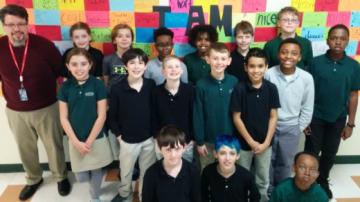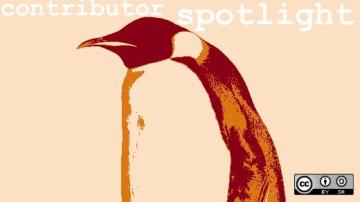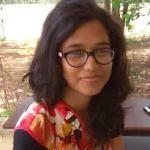When I entered the engineering program as a freshman in college, I felt like a frivolous teenager. In my sophomore year, and in a fortunate stroke of serendipity, I joined Zairza, a technical society for like-minded students who collaborated and built projects separate from the academic curriculum. It was right up my alley. Zairza provided me a safe space to learn and grow and discover my interests. There are different facets and roadways to development, and as a newbie, I didn't know where my interests lay.
I made the switch to Linux then because I heard it is good for development. Fortunately, I had Ubuntu on my system. At first, I found it obnoxious to use because I was used to Windows. But I slowly got the hang of it and fell in love with it over time. I started exploring development by trying to build apps using Android and creating data visualizations using Python. I built a Wikipedia Reader app using the Wikipedia API, which I thoroughly enjoyed. I learned to use Git and put my projects on GitHub, which not only helped me showcase my projects but also enabled me to store them.
I kept juggling between Ubuntu and other Linux distributions. My machine wasn't able to handle Android Studio since it consumed a lot of RAM. I finally made a switch to Fedora in 2016, and I have not looked back since.
At the end of my sophomore year, I applied to Rails Girls Summer of Code with another member of Zairza, Anisha Swain, where we contributed to HospitalRun. I didn't know much about the tech stack, but I tagged along with her. This experience introduced me to open source. As I learned more about it, I came to realize that open source is ubiquitous. The tools I had used for a long time, like Git, Linux, and even Fedora, were open source all the while. It was fascinating!
I made my first contribution when I participated in Hacktoberfest 2017. I started diving deep and contributing to projects on GitHub. Slowly, I began gaining confidence. All the communities were newcomer-friendly, and I no longer felt like a fish out of water.
In November 2017, I began learning about other open source programs like Google Summer of Code and Outreachy. I discovered that Outreachy runs twice a year and decided to apply for the December to March cohort. It was late to apply, but I wanted to participate. I chose to contribute to Ceph and built some data visualizations using JavaScript. The mentors were helpful and amiable. I wasn't able to get through the project but, to be honest, I didn't think I tried hard enough. So, I decided to participate in the next cohort and contribute to projects that piqued my interest.
I started looking for projects as soon as they were announced on the Outreachy website. I found a Django project under the Open Humans Foundation and started contributing. I wasn't familiar with Django, but I learned it on the go. I enjoyed every bit of it! I learned about GraphQL, Django, and APIs in general. Three months after I started making contributions, the project announced its new interns. To my utter surprise, I got through. I was overjoyed! I learned many new things throughout my internship, and my mentor, Mike Escalante, was very supportive and helpful. I would like to extend my heartfelt gratitude to the Open Humans Foundation for extending this opportunity to me. I also attended PyCon India in Hyderabad the same year. I had never attended a conference before; it felt great to meet other passionate Pythonistas, and I could feel the power of community.
At the end of 2018, when I was edging closer to the end of my engineering program, I started preparing for interviews. That was a roller-coaster ride. I wasn't able to get past the second technical round in most of them.
In the meantime, I participated in the Processing Foundation's fellowship program, where I worked with two other fellows, Nancy Chauhan and Shaharyar Shamshi, on promoting software literacy and making Processing's tools accessible to the Indian community. I applied as a mentor to open source programs, including GirlScript Summer of Code (GSSoC). Despite being a first-timer mentor, I found it really rewarding.
I also delivered a talk on my Outreachy project at DjangoCon Europe in April 2019. It was my first talk and also my first time alone abroad! I got a chance to interact and connect with the larger Django community, and I'm still in touch with the Djangonaut friends I made there. In July 2019, I started a PyLadies chapter in Bhubaneswar, India, which held its first meetup the same month.
I went on job interviews relentlessly. I felt despondent and useless at times, but I realized I was getting better at them. I learned about internship openings at Red Hat in June 2019. I applied, and after several rounds, I got one! I started interning with Red Hat at the end of July and started working full time in January 2020.
It's been a year since I joined Red Hat, and not a single day has gone by without me learning something. In the last year, I have mentored in various open source programs, including Google Code-In, GSSoC, Red Hat Open Source Contest, and Mentors Without Borders. I have also discovered that I love to attend and speak at conferences. So far, I have spoken at conferences including PyCon, DjangoCon, and Git Commit Show and local meetups including Rails Girls Sekondi, PyLadies Bangalore, and Women Techmakers Bhubaneswar.
This journey from a confused teenager to a confident learner has been fulfilling in every possible way. To any student reading this, I advise: never stop learning. Even in these unprecedented times, the world is still your oyster. Participating in open source internships and other programs is not a prerequisite to becoming a successful programmer. Everyone is unique. Open source programs help boost your confidence, but they are not a must-have. And, if you do participate, even if you don't complete anything, don't worry. Believe in yourself, and keep looking for new opportunities to learn. Keep feeding your curiosity—and don't forget to pat yourself on your back for your efforts. The tassel is going to be worth the hassle.







2 Comments